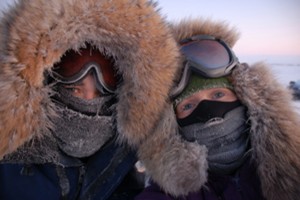
In a country that spans 7,500km it’s not always easy to make sure everybody gets a good education. Imagine what it’s like in a rural community like Igloolik, Nunavut, which is between mainland Canada and Baffin Island, on the 69th parallel?
Although Igloolik means ‘Place of Houses’ in Inuit, less than 2000 people live there and housing for those people is in very short supply. Getting even simple grocery, let alone books and teaching resources is a challenge. And, probably most importantly, qualified teachers are in very short supply.
Two of the people who do live in Igloolik are UBC Faculty of Education graduates Dean Morrow and his wife Leah. Both completed the West Kootenays Teacher Education Program (WKTEP) in 2008. That program is jointly run by the University of British Columbia and Selkirk College and is specifically designed to help train teachers who want to live and work in rural communities.
Morrow and his wife are self-confessed world travelers and thought seriously about taking their newly-minted UBC teaching degrees overseas after they graduated in 2008. However, after posting their resumes to the Education Canada web site they were quickly contacted by the Principal of Ataguttaaluk Elementary School in Igloolik. A number of conversations and some soul searching later and the two decided there were just too many benefits to pass up on moving to Igloolik.
“Being world travelers we had put some thought into looking overseas [for jobs], but the appeal of a completely different culture, landscape, and lifestyle in our own country proved to be more powerful,” says Morrow. “Starting a teaching career in the remote north also offers a huge financial benefit because of higher salaries and remote living allowances and tax benefits.”
But even with their experience traveling across continents, the Morrow’s were in for a few surprises in Canada’s Great White North. Imagine finding out that you actually liked the taste of raw seal liver and whale blubber, for example? Or seeing the massive skin of a freshly slain polar bear hanging in your neighbour’s back yard? Perhaps more seriously, imagine the very real sense of almost complete isolation.
“The reality of not having a road connect you to anywhere else was a bit of an isolating feeling for sure,” says Morrow. “I mean, we knew we in were on an island, and we knew they were no neighbouring communities close-by, but you don’t really appreciate your true isolation until arrive here and think about the physical distance between you and the nearest southern city.”
Despite that isolation, Morrow says, there are some things that don’t change no matter where you go.
“Kids in small towns are just the same as kids in big cities,” says Morrow. “They’re kids. A difference being in a big city is you don’t feel like a superhero when you walk into a grocery store. In Igloolik, outside of school you can’t walk anywhere without seeing the children you teach. They generally love their teachers, and often ask to come over and hang out, which we don’t allow. Even walking down the streets, you’ll hear your name being bellowed from 200m away, or from the inside of a house.”
UBC’s Faculty of Education continues to develop programs and support research that will help isolated rural communities like Igloolik. In fact, with the recent $2-million donation of Dr. Don Rix to support rural teacher education specifically, that commitment has never been stronger.
“This generous gift will help UBC provide leadership in rural teacher education and begin to address issues of educational access and opportunity for rural communities through B.C.,” says Rob Tierney, dean of the Faculty of Education. “The blueprints for rural teacher education that are developed here will be used in communities worldwide.”
And that means more superheroes like the Morrow’s for places like Igloolik.


Hi, this is a comment.
To delete a comment, just log in and view the post's comments. There you will have the option to edit or delete them.